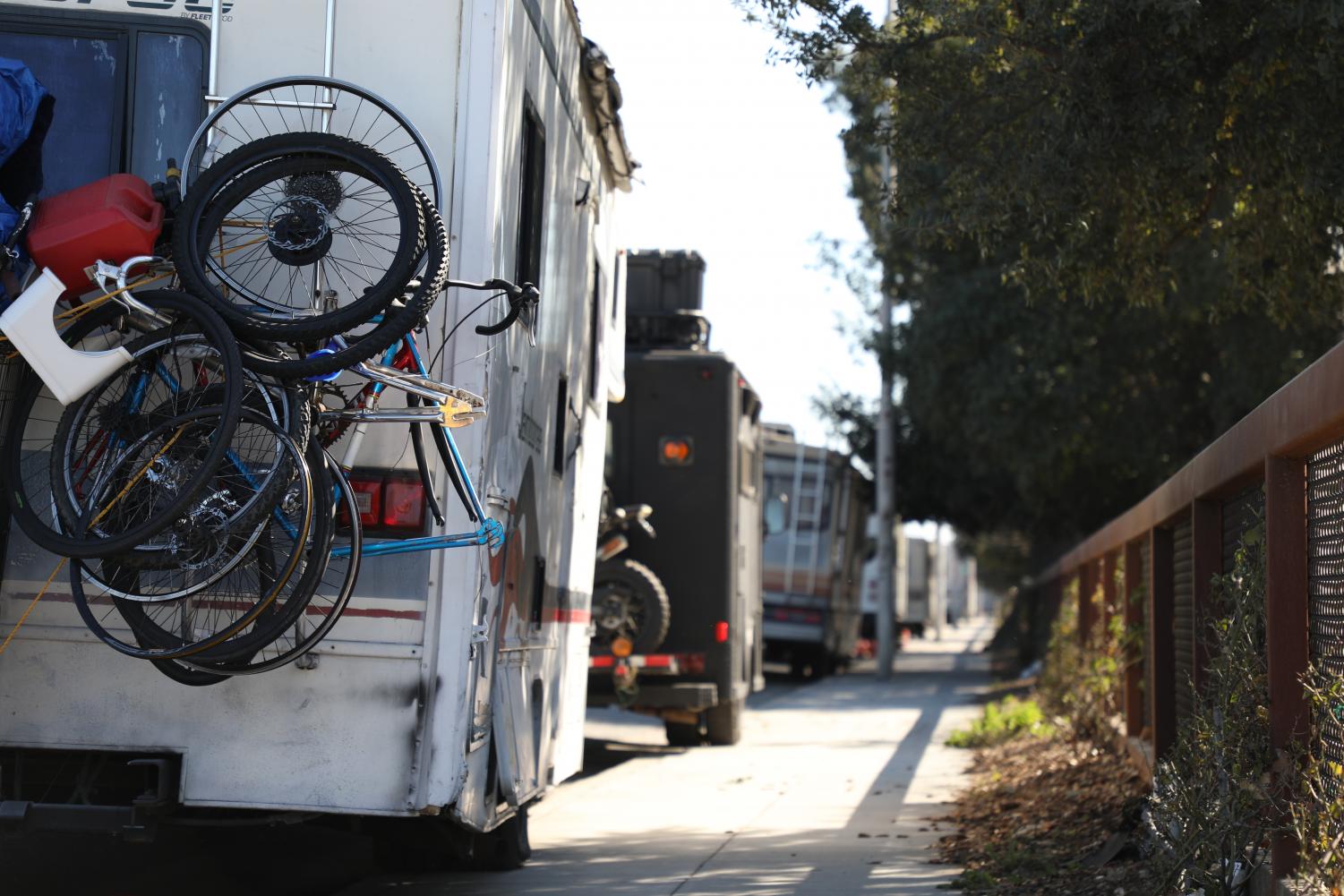A closer look: Mountain View’s housing crisis
March 1, 2020
The Problem
California is the wealthiest state in the United States, with a GDP larger than those of many nations. Yet at the same time, it has the highest level of homelessness, at almost 130,000 people, or a quarter of the nation’s homelessness. Santa Clara County holds almost 10,000 of these people, with a homeless population of over 600 in Mountain View alone.
At the heart of Silicon Valley, Mountain View is a prime location for many high-income earners. The root of the issue in Mountain View lies mainly in the lack of affordable housing as luxury housing continues to increase.
“People are getting evicted for new houses because high-tech workers can afford them,” local housing activist Irene Yoshida said. “They want to be close to their employer, and they can always outbid on any luxury apartment because they are high-wage earners.”
That leaves people with little choices in what to do.
“It’s essentially these choices for folks: You either fall deeper into debt, you fall into homelessness or you get the hell out,” executive director of the Community Services Agency Tom Myers said.
Furthermore, requirements to build affordable housing alongside these luxury units have not been very effective, as developers can find loopholes to build housing that still remains outside of low-income residents’ means.
“They can say that it’s below-market-rate housing, and that’s great, but they don’t talk about for whom because there are different levels of poverty,” Myers said. “What we need is not just affordable housing; we need housing for people who have extremely low incomes.”
Because of this, low- and mid-income workers are being outpaced by gentrification, which makes it difficult for them to continue to work in the area.
“The wage you give them is not enough, and they’re having to live way far away in San Jose or Morgan Hill,” Yoshida said. “They want to stay, but they can’t. Sometimes I wonder if these high-wage earners realize that they need to have restaurant workers, service workers and librarians. We need to have all of us.”
People in the area have resorted to short-term rentals, mobile homes and even homelessness as a result.
“These kinds of living situations just aren’t sustainable,” Myers said. “It’s really, really difficult for a person to advance in life and be able to save money on their own and make their lives more stable if they are putting out huge amounts of money for rent in these more unorthodox ways.”
With all these types of unorthodox housing, there also seems to be a separation from the rest of the community.
“They’re residents of Mountain View, but once they get an RV, they’re not considered members of the community,” Yoshida said. “When I was a renter, too, I never felt like I was part of the community. People in RVs are still citizens—they’re residents.”
Short-Term Rentals
Short-term rentals, or STRs, allow people to rent out portions of their property for short periods of time (30 days in the City of Mountain View). In most cases, this means renting out individual rooms, such as the kitchen or living room, to different individuals.
According to Rosa Mancilla, who works with local nonprofits on the issue, this is a usual scenario: A family rents out a two-bedroom apartment for $3,000 a month. However, because this family cannot afford their own rent, they rent out one bedroom to another family for $1000 and their living room to a third family for $600 a month.
More extreme examples exist too. According to Myers, one man took to renting a bathtub to sleep in for $500 a month. In 2015, Mountain View resident John Potter used Airbnb to rent out a tent in his backyard. The cost was $46 a night, about $900 a month.
Because these conditions are not regulated in the same ways that typical apartments are, there are sometimes safety issues, such as fire hazards. Two of the families Mancilla has worked with experienced fires as a result of too many people plugging devices into electrical outlets. In one instance, the whole apartment was burned.
Due to the wording of some of the lease agreements for renters, there are sometimes conflicts with landowners. Landlords will threaten and push tenants out, forcing many to hide what they are doing.
Myers says most tenant protection laws are based on whether people are on the lease. This means that people giving money under the table, like in these STRs, don’t receive protections.
“It’s reality, but it’s invisible,” Yoshida said.
While some STRs, like the aforementioned examples, operate within gray areas of the law, there are currently regulations in place to accommodate these sorts of living conditions. According to Mountain View Communication Coordinator Shonda Ranson, STRs are legal so long as they don’t receive complaints and have the proper registration and permits. Mountain View has hired a company called Host Compliance to monitor these complaints and violations.
Ranson said she is not aware of any particular incidents involving safety and legal issues, including fires. Host Compliance did not respond to a request for comment.
Legislative Changes
The path to new legislation may not be simple, however, as evidenced by efforts to pass the CSFRA in 2016. Daniel DeBolt, an ex-journalist who covered the Mountain View City Council and an avid activist for Measure V, testified to how difficult the process was.
“It felt like I was fighting a war,” DeBolt said. “It bothers me that it’s so exhausting to simply protect people from becoming homeless. That shouldn’t be a fight that anybody has to do over and over and over for years.”
The next ballot has a new measure regarding rent control called Measure D. The main parts of the measure include increased rent rises to four percent annually (permitting extra increases to pay for house improvements), banning the payment RHC members’ salaries and formally separating mobile homes from Measure V. Many believe that this will weaken rent control restrictions.
One of the contentious sections of Measure D was the separation of mobile homes from Measure V, as many thought this was an effort to decrease regulation and allow park owners to increase rents unfettered. According to City Council member Chris Clark, though, this was to allow for less oversight from the RHC and more direct involvement of City Council.
At the Mountain View City Council meeting, Doug Johnson from the Western Manufacturing Housing Communities Association brought up long-term negotiations and leases with park owners as an alternative to rent control, which multiple council members expressed interest in. These long-term leases would set rent prices and increases over a period of time (given examples seemed to be around a decade or longer), which would limit excessive price hikes; however, these policies rely on park owner cooperation to be effective, as they are voluntary. Once park owners agree, though, they are contractually bound to comply.
Multiple sources agreed that building more units would be the only viable solution in the long run.
“I really don’t like how people say it’s a housing crisis,” DeBolt said. “This is a people crisis. This is a tenant crisis. This is a homeowner crisis. This is a human crisis. It’s everybody’s crisis.”



